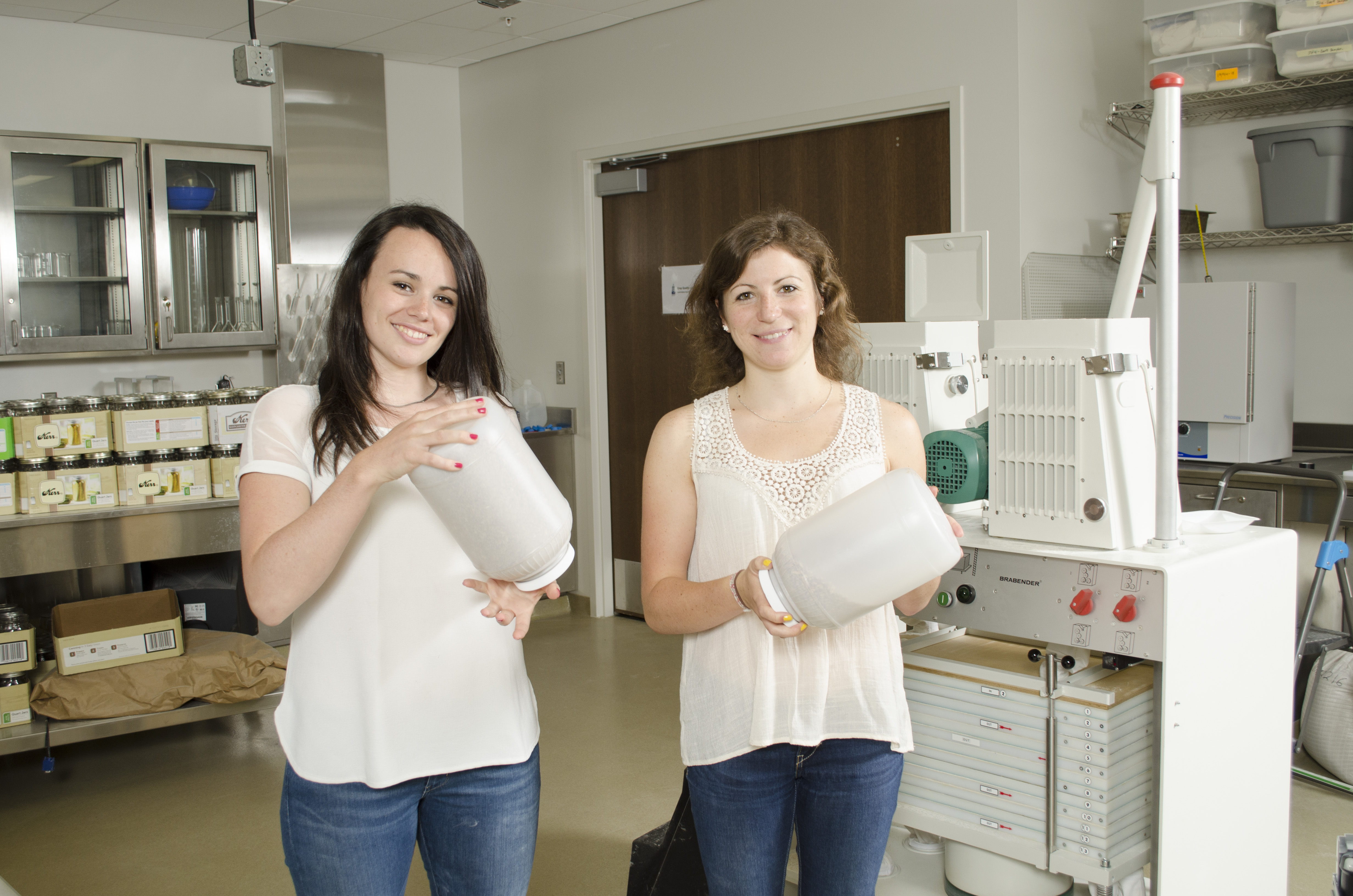
Brookings, S.D. (KELO AM) -Two college students from Toulouse, France, are completing a 10-week internship milling wheat and researching how to expand the loaf volume of bread. Elodie Payrau and Floriane Bouchet are agronomy food science and management students in their second year at École Nationale Supérieure Agronomique of Toulouse.
The students are working with department of health and nutritional sciences professor Padmanaban Krishnan in the South Dakota State University Seed Technology Laboratory as part of a long-standing partnership between SDSU and ENSAT. Krishnan sponsored the two interns with funds from the South Dakota Wheat Commission, and is collaborating with wheat scientists Karl Glover and Melanie Caffe-Treml. "We have had successes with other students who returned to complete Ph.D. programs here at SDSU," said Krishnan. "Melanie Caffe-Treml is a former ENSAT student, and is now officially a department of plant science faculty member of the research team on small grains." The students' duties include wheat quality measurements, which begins with the harvested wheat and end in the ultimate processing into a food item, bread. The process of milling wheat can be described as the "5 Cs," namely, cleaning, conditioning, crushing, classifying and consigning the wheat. During conditioning or tempering, the students add a specific amount of water to the wheat at several stages to get it to a 15.5 percent moisture level. This is the best condition to separate the bran from the flour. At this stage, the bran is toughened and flakes off as opposed to being pulverized when milled. Glover said the goal of their research is to find linkages between genetic and environmental factors and food production variables such as bread loaf volume—which is the "holy grail" in the baking industry. "Elodie and Floriane are helping me look at bread in its final stages," said Krishnan.
A dough expansion system, which is an SDSU invention, expands dough in a vacuum chamber as if it was rising in an oven. Then, a computer estimates the dough volume based on real-time images without having to bake the bread. With the dough expansion system, the researchers can evaluate wheat samples in less than two minutes, as opposed to days and weeks. "The interns did the hard work of analysis so we can tell how well the instrument worked," said Caffe-Treml. "Preliminary results from their work shows a very strong correlation between a chemical test and true loaf volume… and this is encouraging." "We have had great success with French students in the past," said Krishnan, noting that Payrau and Bouchet have analyzed 40 samples each of spring wheat and winter wheat from SDSU's breeding programs.
"I want them to use what they learn here in their own educational studies, and the plan is to publish their work in the Journal of Cereal Chemistry," said Krishnan. "These two students bring talent to the pool." From big city to small town Being from the fifth largest city in France, the students noticed many differences between small-town Brookings and Toulouse. "Downtown here is very boxy," said Bouchet. "In France it's more of a circular layout, with much more shopping and restaurants." This was Payrau's first visit to the United States, but Bouchet has taken family vacations to New York and Florida. "Everything here is so much bigger—food portions and quantities are much larger," said Payrau. "It's impossible to find small drinks. We go into the store and only find liter bottles of water." The students also picked up on Brookings' Midwestern charm. "People here are much more friendly," said Payrau. "In France, they're more proud, and if you don't know someone walking down the sidewalk, you don't say 'hi.'" Both students agreed the internship has been worthwhile, and hope to return to SDSU one day. "Even though it's very different from France, we really like it here," said Bouchet. "We have learned a lot over the summer." SDSU, ENSAT partnershipThe relationship between SDSU and ENSAT emerged from personal relationships at both institutions, and these individual links continue to form an important basis of the ongoing connection. Over the years, SDSU leadership and coordination of the exchange program has been taken on by SDSU faculty in departments, including plant science, sociology and rural studies, and physics.The summer laboratory internship program was first instituted between SDSU and ENSAT nearly 30 years ago. The program began from a working relationship between faculty colleagues at both SDSU and ENSAT, incorporating one to three students per year. In recent years, the summer internship program served between 12 and 16 students per year. This year, three ENSAT students are pursuing their internships at SDSU.